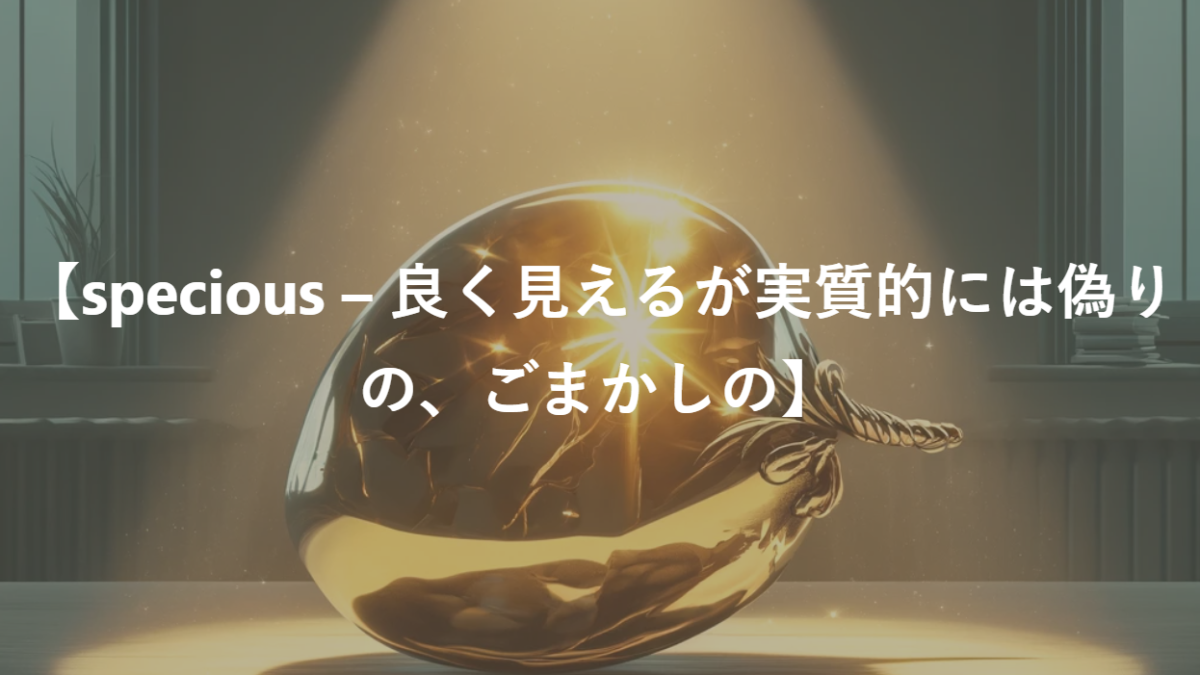語源・類義語・反対語・例文
【specious – 良く見えるが実質的には偽りの、ごまかしの】という単語の語源とか由来を知っていますか?
「Specious」は、表面上は魅力的または説得力があるように見えるが、実際には誤解を招くか根拠がないという意味で使われます。この単語は、ラテン語の「speciosus」から派生しており、「美しい」や「見栄えがする」という意味があります。さらにその根はラテン語の「species」に遡りますが、これは「外観」や「見た目」という意味を持ちます。
当初、「specious」は美しさや外見の魅力に関連する肯定的な意味合いで使用されていましたが、時間が経つにつれてその意味は変化しました。現代英語では、何かが表面的には正当または魅力的に見えるが、実際には深く掘り下げるとその正当性や価値が欠如していることを指すために使用されます。この意味の変化は、外見が実際の価値や真実を常に反映するわけではないという認識を反映しています。
“Specious” is used to describe something that appears attractive or convincing on the surface, but is actually misleading or lacking in foundation. This word is derived from the Latin “speciosus,” which means “beautiful” or “good-looking.” Furthermore, its root can be traced back to the Latin word “species,” which means “appearance” or “look.”
Initially, “specious” was used in a positive sense related to beauty or the charm of appearance. However, over time its meaning has evolved. In modern English, it is used to denote something that superficially seems legitimate or appealing, but upon closer examination lacks justification or value. This shift in meaning reflects the understanding that appearance does not always mirror real worth or truth.
この単語の類義語・反対語を教えてください。
類義語
- Deceptive(偽りのある):本当とは異なる情報を与えることで人を欺くという意味があります。 「specious」と同様に、信用できない印象を与える単語です。
- Fallacious(誤った、欺瞞的な):論理的に誤りである、または正しくない主張や情報を意味します。「specious」と同じく、信用できないものを表現する単語です。
- Misleading(誤解を招く、誤解を与える):正確な情報や主張でない、不正確な情報を提供するという意味があります。「specious」の場合と同様、不信感を引き起こす単語です。
反対語
- Genuine(真実の、本物の):偽りやごまかしがなく、正真正銘であることを表す単語です。「specious」の反対語としてよく用いられます。
- Authentic(真正の、本物の):本物であることを強調したい場合に用いられる単語です。 「specious」と同様、信頼性に関する印象を表す単語として考えられます。
似た単語で間違いやすい単語はありますか?
- Spurious: この単語も「偽の」や「誤った」という意味で、「specious」と非常に似ていますが、「spurious」は偽造されたものや事実でないものを指すことが多く、根拠のない主張やデータに使われます。
- Fallacious: 「誤った推論に基づく」や「欺く意図のある」という意味で、「specious」と同様に誤解を招く情報や論理に使われます。しかし、「fallacious」は特に論理的な誤りや推論の誤りを指摘する際に使われることが多いです。
- Meretricious: 「外見は魅力的だが価値がない」や「安っぽい」という意味で、外観による騙しの側面を強調しますが、「specious」と比べてより表面的な魅力や虚飾を指すことがあります。
- Sophistic: 「詭弁の」や「巧みだが誤解を招く論理を用いる」という意味で、「specious」同様に誤解を招く可能性のある論点や主張に関連していますが、特に古代ギリシャの詭弁術師(ソフィスト)の手法を連想させる用語です。
この単語を使った例文
The politician’s promise turned out to be a specious argument, lacking real solutions.
政治家の約束は、実際の解決策を欠いているごまかしの議論であることが判明しました。
They offered me a deal that seemed beneficial, but upon closer inspection, it was a specious offer.
彼らは私に有益に見える取引を提供しましたが、よく調べてみるとそれはごまかしの申し出でした。
The company’s commitment to environmental sustainability was merely specious, as their actions contradicted their words.
会社の環境持続可能性への取り組みは、彼らの行動が彼らの言葉と矛盾していたため、単に見せかけのものでした。
The argument that the project would not affect the local wildlife was specious and unsupported by scientific evidence.
プロジェクトが地元の野生生物に影響を与えないという主張は、科学的証拠によって支持されていない偽りのものでした。
Her reasons for leaving the job were specious, hiding the real issues she faced in the workplace.
彼女が仕事を辞める理由はごまかしのもので、職場で直面していた実際の問題を隠していました。
【specious – 良く見えるが実質的には偽りの、ごまかしの】のコロケーション
- Specious Argument: ごまかしの論点。論理的には一見正しそうに見えるが、実際には誤りや欠陥がある論点を指します。これは、議論や討論の文脈でよく用いられる表現です。
- Specious Reasoning: ごまかしの推論。表面上は合理的に見えるが、実際には論理的な誤りや不合理性を含む推論を指します。批判的思考を促す文脈で使用されます。
- Specious Logic: うわべだけの論理。論理的に見えるが実際には誤ったり不十分な根拠に基づく論理を指します。この表現は、誤解を招くような論理展開を批判する際に用いられます。
- Specious Excuse: 見せかけの言い訳。表面的には妥当な理由のように見えるが、実際にはその正当性が乏しい言い訳を指します。個人の行動や決定を正当化する試みを指摘する文脈で使われることがあります。
- Specious Evidence: 表面的な証拠。信頼性が低いか、誤解を招く可能性のある証拠を指します。このような証拠は、真実ではない主張を支持するために使われることがあります。
対話と討論の複雑なダンスにおいて、「specious」という用語はしばしば中心的な役割を果たし、特定の議論や推論の魅惑的な偽りを浮き彫りにします。
「Specious Argument」は、一見論理的に正しそうに見えるが、より詳細に検討すると誤りや欠陥がある論点を指します。この表現は、議論や討論の文脈で一般的に使用され、真の妥当性を欠くように見える一貫した議論に惑わされないよう警戒するために役立ちます。
「Specious Reasoning」は、表面上は合理的に見えるが、論理的な誤りや不合理性を含む推論を示します。批判的思考を促す文脈で使用され、個人に対して合理性の外観を超えて基礎となる誤謬を明らかにするよう促します。
「Specious Logic」は、論理的に見えるが実際には誤ったり不十分な根拠に基づいている論理を指します。この用語は、誤解を招くような論理展開を批判する際に用いられ、根拠の厳密な検討の重要性を強調し、根拠のない結論に惑わされないようにします。
「Specious Excuse」は、表面的には妥当な理由のように見えるが、実際にはその正当性が乏しい言い訳を指します。この言い訳は、分析すると持ちこたえられない個人の行動や決定を正当化する試みを指摘する文脈で使用されることがあります。
「Specious Evidence」は、信頼性が低いか、誤解を招く可能性のある証拠を指します。このような証拠は、真実でない主張を支持するために使われることがあり、証拠として提示される情報の信頼性と関連性を評価する際の警戒が必要です。
これらのシナリオのそれぞれにおいて、形容詞「specious」は表面を超えてより深く見るよう警告として機能し、真実の本質と単なる見せかけを区別するために、より深い探求と理解を促進します。
In the intricate dance of dialogue and debate, the term “specious” often takes center stage, highlighting the deceptive allure of certain arguments and reasonings.
“Specious Argument” refers to points that seem logically sound at first glance but are actually flawed or incorrect upon closer examination. This expression is commonly used in the context of discussions and debates, serving as a caution against being misled by seemingly coherent arguments that lack true validity.
“Specious Reasoning” denotes reasoning that appears rational on the surface but contains logical errors or irrationalities. It is utilized in contexts that encourage critical thinking, urging individuals to look beyond the facade of rationality to uncover the underlying fallacies.
“Specious Logic” points to a logic that, while seemingly logical, is actually based on incorrect or insufficient grounds. This term is employed when criticizing misleading logical developments, emphasizing the importance of scrutinizing the foundation of arguments to prevent being swayed by unfounded conclusions.
“Specious Excuse” refers to excuses that seem valid superficially but lack genuine justification. It is often used to point out attempts to justify personal actions or decisions that, when dissected, do not hold up to scrutiny, highlighting the thin veneer of legitimacy that covers deeper inadequacies.
“Specious Evidence” identifies evidence that is unreliable or likely to mislead. Such evidence is sometimes used to support claims that are not true, emphasizing the need for vigilance in assessing the credibility and relevance of the information presented as proof.
In each of these scenarios, the adjective “specious” serves as a warning to peer beyond the surface, encouraging a deeper exploration and understanding to distinguish between genuine substance and mere semblance.
練習問題
文法問題
問題1
Choose the correct word to complete the sentence.
“Her argument seemed convincing at first, but upon closer examination, it turned out to be __.”
(A) spacious
(B) specious
(C) special
(D) specific
解答1
(B) specious
解説1
この文では「彼女の主張は最初は説得力があるように思えたが、詳しく調べると偽りであることがわかった」という意味です。”specious” は「良く見えるが実質的には偽りの、ごまかしの」という意味で、文脈に最も適しています。他の選択肢は文脈に合いません。
問題2
Fill in the blank with the correct word.
“The advertisement made __ claims about the product’s effectiveness, which misled many consumers.”
(A) spacious
(B) specious
(C) special
(D) specific
解答2
(B) specious
解説2
この文では「広告は製品の効果について誤解を招くような主張をしており、多くの消費者を誤解させた」という意味です。”specious” は「良く見えるが実質的には偽りの、ごまかしの」という意味で、文脈に最も適しています。他の選択肢は文脈に合いません。
問題3
Select the best option to complete the sentence.
“Politicians often make __ promises during election campaigns, but fail to deliver once in office.”
(A) spacious
(B) specious
(C) special
(D) specific
解答3
(B) specious
解説3
この文では「政治家は選挙キャンペーン中にしばしばごまかしの約束をするが、就任後にそれを果たせない」という意味です。”specious” は「良く見えるが実質的には偽りの、ごまかしの」という意味で、文脈に最も適しています。他の選択肢は文脈に合いません。
問題4
Complete the sentence with the appropriate word.
“The lawyer’s __ argument initially swayed the jury, but the opposing counsel quickly exposed its flaws.”
(A) spacious
(B) specious
(C) special
(D) specific
解答4
(B) specious
解説4
この文では「弁護士のごまかしの議論は最初は陪審員を動かしたが、相手方の弁護士がすぐにその欠点を暴露した」という意味です。”specious” は「良く見えるが実質的には偽りの、ごまかしの」という意味で、文脈に最も適しています。他の選択肢は文脈に合いません。
問題5
Choose the correct option to complete the sentence.
“The scientist’s theory was dismissed as __ because it lacked empirical evidence.”
(A) spacious
(B) specious
(C) special
(D) specific
解答5
(B) specious
解説5
この文では「科学者の理論は実証的な証拠が欠けているため、偽りであるとして却下された」という意味です。”specious” は「良く見えるが実質的には偽りの、ごまかしの」という意味で、文脈に最も適しています。他の選択肢は文脈に合いません。

